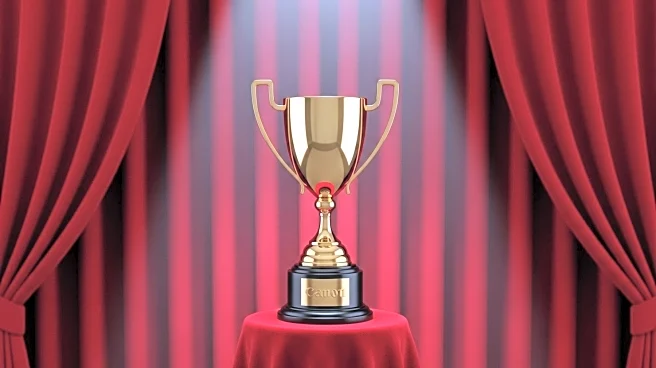What's Happening?
On October 6, 2025, during a segment on Jimmy Kimmel Live!, actor Seth Rogen made a remark that reignited controversy surrounding a 2021 Emmy Awards incident. Rogen's comment, 'We are in a hermetically sealed tent right now,' echoed a previous unscripted jibe he made during the 2021 ceremony, which had led to tensions over COVID-19 safety protocols and resulted in a ban from presenting at the Emmys. The remark has sparked renewed debate over the appropriateness of unscripted comments during award ceremonies and the balance between candidness and decorum. Rogen, who won two personal Emmys in 2025, has become a focal point in discussions about whether high-profile winners should be allowed more leeway in their public statements.
Why It's Important?
The incident highlights ongoing tensions between the entertainment industry’s desire for authenticity and the need for maintaining decorum during formal events. Rogen's remarks have polarized opinions, with some praising his candidness and others criticizing the potential impact on ceremony optics and safety-era sensitivities. This debate is significant as it may influence how award shows manage presenter conduct and the extent to which unscripted comments are tolerated. The situation underscores the broader cultural conversation about the role of celebrities in shaping public discourse and the expectations placed on them during high-profile events.
What's Next?
The backlash from Rogen's comments may prompt Emmy producers to reassess their presentation rules and credentialing processes for future ceremonies. Networks might weigh the benefits of star power against the risks of unscripted remarks that could disrupt the event's tone. This could lead to stricter guidelines for presenters or a shift in how award shows balance authenticity with formal decorum. The entertainment industry will likely continue to grapple with these issues as it seeks to adapt to changing audience expectations and cultural norms.
Beyond the Headlines
The controversy surrounding Rogen's remarks also touches on broader ethical considerations about freedom of expression versus the responsibilities of public figures. It raises questions about whether fame should protect individuals from the consequences of their statements and how much influence celebrities should wield in public debates. This incident may contribute to long-term shifts in how award shows and other public events are structured, potentially leading to more controlled environments or a reevaluation of the role of humor and spontaneity in formal settings.











